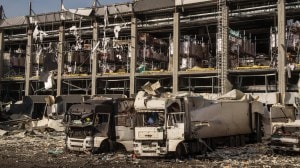Error on terror
Non-UPA chief ministers should have been more mature on NIA discussion
The aftermath of the Mumbai terror attacks saw a visible outpouring of anger against the entire political class. This newspaper had decried that sentiment as naïve,calling instead for political engagement. The absence of overt partisan bickering in the first few weeks following the attacks was a hopeful sign that the national debate on terror had concluded with something of a consensus. Sadly,the attempts at headline-grabbing at the ongoing chief ministers conference have shattered that optimistic illusion.
The chief ministers conference is a necessary aspect of the states response: the trans-boundary nature of battling terrorism is ill-served by confining law and order to individual states. This was the occasion on which a cross-partisan,federal consensus should have been articulated. Instead,what could have been a reasonable discussion about the merits and demerits of the National Investigation Agency,which requires an extension of Central power,was perverted by political manoeuvring. At the first truly national attempt to craft a political response to the security crisis,chief ministers from parties in opposition at the Centre chose to undercut their substantive arguments by grandstanding.
Let this not be misunderstood: the structure of an important new agency,an expansion of Central power,need input from across the political spectrum. And some of the points that have been raised the question of whether the new agencys head should have security of tenure,for example are perfectly acceptable,and open,questions. Yet there are questions of presentation at stake. The country,and the world,needed to see a mature political class; instead,they got Narendra Modi petulantly claiming that he had thought of an all-party conference simply years ago and that he wished the Centre all success in its attempt to side-track the states. That was the most egregious example: but there were others from across the political spectrum. An opportunity has been missed; it will require grown-up politics to recapture it.



- 01
- 02
- 03
- 04
- 05




























